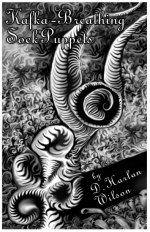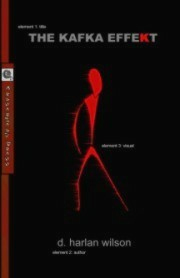|
The
Man's Cheek/Kafka's Human Skin Journal
Interview
#3: D. Harlan Wilson |
 |
|
Be sure to read below for Wilson's new short story, "Before the Board of Directors." In the meantime enjoy a chat with one of North America's leading surrealists, illustrated by Simon Duric! JOHN LAWSON: Please describe your stories for those unfortunates who have yet to read your writing.
jl: Do you have any writing quirks, such as needing to write standing up or naked? dhw: Nope, no quirks. I'm a pretty boring writer: I write in the mornings, usually between 9 and 12, drinking coffee and thinking about what I'm going to eat for lunch. While I'm writing, however, I do make a point of wearing a suit of human skin over my own skin which is an exact replica of my own skin. I also wear a mask of my own face. Is that quirky? jl: What audience do you aim for, or is there an audience for your style? dhw: I write mainly for introspective twentysomethings and thirtysomethings, not because I want to or feel a need to make a connection with that audience, but because I am that audience: I'll be 31 next month. Also, my writing is very male. I'm not saying I aspire for the same kind of manly ethic as Ernest Hemingway or Henry Miller. Rather, my interests lie in the way in which the contemporary patriarchy, which is nothing like it used to be but which is still very much in power, affects and produces both the male and the female socius. Gender relations are highly complex. A great deal of my fiction attempts to express and, in some cases, flesh out that complexity.
dhw: Hinder it. Definitely. The world we live in today, particularly in America, is entirely grounded in and driven by capitalism; and what capitalism encourages, what it desires and needs, is the consumption of products. If you are buying products on a regular basis, capitalism says, you are adequate, you are sane. If you are not buying products on a regular basis, it says, you are an inadequate douche bag. To poke fun at this dynamic by representing it in an absurd light is an easy thing to do, I think. But capitalism, naturally, doesn't like to be harassed. Since we are all capitalists whether we like it or not, since we are trained from day one to view and treat money like God, the cultivation of an absurdist literature that critiques the infrastructure of our existence, directly or indirectly, is a fruitless endeavor in the long run. If a writer wants to make any money, that is. Right now I don't write to make money: I'm a professor by trade. Today's absurdist literature has a relatively small readership and if I ever want to appeal to a wider audience (in other words, if I ever want to make more money) I'll have to tame my absurdist voice and make it more mainstream, which means I'll have to make it less interesting, provocative and funny. As a capitalist, I unfortunately see myself doing this in the near future. jl: Could you take Kafka in an arm wrestling match?
jl: Who is "The Man?" dhw: I assume you're referring to The Man character in my story "Stagefright," which explores the psychology of public urination, particularly the depth of the anxiety I experience when I urinate in public restrooms. In that story, The Man represents both the men whose presences are making it difficult for the paranoid protagonist to urinate as well as the paranoid protagonist himself: he can't urinate because he's worried about what other men will think of him. It's a power-knowledge relationship. As the narrator of "Stagefright" says about the men who are able to pee freely in his presence, "they can hear his urine not hitting the porcelain of the urinal and conclude (rightly so) that he can not urinate in their presence. Because of this knowledge they are superior to him. Because of this knowledge they have power over him. The man anticipates this transference of power-knowledge long before he even walks into the restroom. He psyches himself out and, in effect, is a loser before he even begins to play the game." So The Man operates on the narrator from the outside as much as from on the inside. He might best be thought of as a voice rather than a fleshly being. At any rate, in one guise or another, The Man is present in virtually all of my stories. He is anybody who functions as an antagonist, who problematizes the lives of my protagonists by either actively or passively subjugating them—from the inside out, or from the outside in, or both. jl: AAS Reviews referred to you as "cheeky." Is there any more cheek left in D. Harlan Wilson or is he all cheeked out? dhw: Plenty of cheek left, plenty of cheek left. I'm a fairly sarcastic person and that sarcasm, perhaps more than any other aspect of my personality, is reflected in my writing. jl: Do you ever get writer's block? dhw: Sometimes, but very infrequently. I don't write fast. Actually I'm a disgustingly slow writer; I'm easily distracted, and my creative juices flow like cold lard. But I never run out of ideas. There's too many weird people doing too many weird things in the world. And if that doesn't inspire me, I can always turn to my dreams, some of which, in the past, I have converted into story form. I've been keeping an avid dream journal for the last five or so years. I have a few hundred pages containing a few thousand dreams that I might draw on.
dhw: Actually, right now I'm putting the finishing touches on my second collection of stories, Stranger on the Loose. I'm very excited about it. It's being illustrated by the visual artist Simon Duric, who is a real talent. The underlying theme of the collection concerns itself with the intricacies of American urban and suburban family life, which, not surprisingly, I approach from an absurdist angle of incidence. jl: Do you have any advice for your fellow writers? dhw: Yes. Stop writing! There's too much writing out there as it is and anyway if you stop writing there won't be as much competition for me. Just kidding. Well, not really. But if I wasn't kidding, I guess my advice would be to not take yourself seriously. You're just a clever liar, after all. Now
that you've read the interview, read a Dream People exclusive! |
|
Back to the Fiction List
 D.
HARLAN WILSON: Usually when people ask me what kind of stories I write,
I throw the words "offbeat," "surreal" and "dreamy"
out of my mouth and then I shut my mouth. If I get any more in-depth
than that, most people either don't understand or lose interest (albeit
they're usually very good at simulating interest). People don't read,
of course, and if they do read, it's business texts, Oprah novels
and People magazine. Somebody asks me what I write and I start talking
about absurdist representations of Foucauldian power-relations and
the Lacanian real, they don't know what the hell I'm talking about.
(NOTE: I frequent bars more than I should and the people I'm referring
to are the ones I meet and talk to at bars. Usually they're slightly
drunk females who just want me to leave them alone.)
D.
HARLAN WILSON: Usually when people ask me what kind of stories I write,
I throw the words "offbeat," "surreal" and "dreamy"
out of my mouth and then I shut my mouth. If I get any more in-depth
than that, most people either don't understand or lose interest (albeit
they're usually very good at simulating interest). People don't read,
of course, and if they do read, it's business texts, Oprah novels
and People magazine. Somebody asks me what I write and I start talking
about absurdist representations of Foucauldian power-relations and
the Lacanian real, they don't know what the hell I'm talking about.
(NOTE: I frequent bars more than I should and the people I'm referring
to are the ones I meet and talk to at bars. Usually they're slightly
drunk females who just want me to leave them alone.) jl:
Do the times we live in cultivate absurdism—as a point of view,
a market, a culture—or hinder it?
jl:
Do the times we live in cultivate absurdism—as a point of view,
a market, a culture—or hinder it?  dhw:
Well, Kafka was a runt, very scrawny and somewhat sickly, so I think
I could take him. Getting him to agree to an arm wrestling match,
however, would be more of a problem. First I'd probably have to take
him out to a bar and get him drunk on cheap tequila, but before I
did that, I'd have to get him to agree to go out to a bar. Kafka wasn't
much of a bar hound, let alone a drinker; in fact, he barely touched
alcohol. I suppose I could slip a mickey or something into his tea,
loosen him up a little. But if he loosened up a little he might just
be able to summon the inner strength to throw my fist through the
table, despite his physical stature. I think I'd rather square off
with Kafka in a WWF wrestling arena. No matter what sort of motivational
narcotics I gave him beforehand, I'm confident that, in a full contact
match up, I could beat him. One raging closeline off the ropes should
be enough!
dhw:
Well, Kafka was a runt, very scrawny and somewhat sickly, so I think
I could take him. Getting him to agree to an arm wrestling match,
however, would be more of a problem. First I'd probably have to take
him out to a bar and get him drunk on cheap tequila, but before I
did that, I'd have to get him to agree to go out to a bar. Kafka wasn't
much of a bar hound, let alone a drinker; in fact, he barely touched
alcohol. I suppose I could slip a mickey or something into his tea,
loosen him up a little. But if he loosened up a little he might just
be able to summon the inner strength to throw my fist through the
table, despite his physical stature. I think I'd rather square off
with Kafka in a WWF wrestling arena. No matter what sort of motivational
narcotics I gave him beforehand, I'm confident that, in a full contact
match up, I could beat him. One raging closeline off the ropes should
be enough!  jl:
What lies ahead for D. Harlan Wilson? Any projects in the making?
jl:
What lies ahead for D. Harlan Wilson? Any projects in the making?